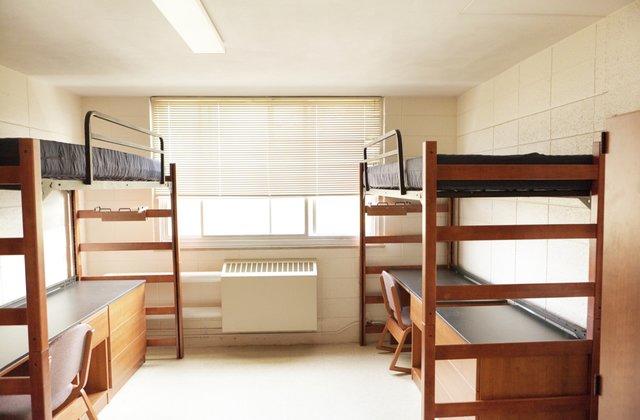Tsunami Of Empty College Dorms Risks Student Housing Market Implosion Tyler Durden Wed, 10/28/2020 - 22:45
Fall enrollment has plunged, some colleges are shuttering operations, revenues across the entire higher education industry are collapsing, and the shift from physical to virtual education due to the virus pandemic could prick the next bubble: the student housing debt market.
Our warning about the coming implosion of the higher education industry (see here from 2014), as a whole, has become louder and louder over the last six-plus years as the student debt bubble has recently swelled to more than $1.6 trillion. Years ago, no one at the time, could've forecasted a virus pandemic would doom colleges and universities.
Credit rating agency Moody's recently downgraded the entire higher education sector to negative from stable, and the American Council on Education estimates colleges and universities will experience a $23 billion decline in revenues over the next academic year.
Bloomberg outlines the increase of virtual education in a virus pandemic has resulted in an abundance of empty dorms at colleges and universities, creating a $14 billion headache for the student housing debt market.
"West Virginia State University, already hit with a 10% enrollment drop, plans to give money to a school foundation so it can meet its bond covenants for residence hall debt. A community college in Ohio is using part of a $1.5 million donation for a financially-strapped student housing project. And officials at New Jersey City University, which serves largely first-generation and lower-income students and has recorded years of deficits, are prepared to shore up a dorm there," Bloomberg said.
The squeeze on university finances comes as the National Student Clearinghouse Research Center warned about a 16% drop in first-year undergraduate students enrolled for the fall semester. This means new revenue streams are quickly drying up for overleveraged colleges and universities.
"The limiting factor is some of these schools themselves are facing uncertainty with many of their revenue streams," S&P Global Ratings analyst Amber Schafer said in an interview. "It's a matter of not only willingness, but if they're able to support the project."
"Typically, privatized student housing debt is paid off by the revenue generated by the dorms -- meaning there's little recourse for bondholders if things go south," Bloomberg said. With occupancy rates already declining as coronavirus cases are surging, well, this could be bad news for colleges and universities heading into 2021.
"Borrowers have begun revealing how empty residence halls are as the pandemic spurs many campuses to keep classes online. According to the school foundation that sold the debt, West Virginia State University's dorm is 71% full, putting it about 20 percentage points from where it needs to be to satisfy debt covenants. Other privatized student housing projects, like two on Howard University's campus, are virtually empty due to online-only instruction there," Bloomberg said.
Bloomberg warns: "Privatized dorms are struggling the most given that they weren't structured to withstand 20% to 30% drops in occupancy -- or no students at all."
"West Virginia State University may have to step in to help student housing bonds at risk of violating a debt service coverage ratio, Moody's warned this month. The historically-black college faces "considerable" challenges in backstopping the bonds, Moody's said.
The nearly 290-bed residence hall with rents of $3,881 per semester was just 71% occupied this fall, while it needed to be about 92% occupied, said Patricia Schumann, president of the university foundation that sold the debt. Schumann said the university is projected to provide a $75,000 payment in January. In the meantime, she said the school was working to bolster its financial position and boost recruitment and donations.
"We're not standing still," she said.
Ohio's Terra State Community College, which has more than 2,100 students, was downgraded deeper into junk over the risk posed by a dorm owned by a nonprofit, given that the school "appears to provide an unconditional guarantee" to meet the debt obligations, Moody's said. The project was financed through a bank note.
The dorm's occupancy fell to 62%, and the college is using a previously-received donation to cover a shortfall in project revenue amounting between $500,000 to $600,000, the ratings company said in a report this month.
At New Jersey City University, a student housing project financed though a separate entity will likely miss a required debt service coverage ratio. The public school having to step in to help the bonds would be a challenge, but a surmountable one, said Jodi Bailey, the university's associate vice president for student affairs. The student housing bonds aren't a debt of the university, so the school would be choosing to provide financial support, according to bond documents.
The school is working to cut expenses related to the dorm. "Is it a harder year? Most definitely," she said.
The student housing bonds, issued by West Campus Housing LLC in 2015, were slashed deeper into junk in September by S&P, which said in a report that residence halls' occupancy there had fallen to 56% so the school could accommodate social-distancing guidelines," said Bloomberg.
To summarize, plunging enrollments, resulting in falling occupancy rates for dorms, is a debt bomb waiting to go off for many overleveraged colleges and universities that are panicking at the moment to divert enough funds to service debts, as the usual revenue streams, that being rent checks from students, are nowhere to be found as virtual learning keeps young adults in their parents' basements and out of dorms.
If occupancy rates continue to slide through 2021, then we must revisit what we said months before the virus pandemic began in the US:
"...20% of colleges and universities will shut down or merge in the next ten years, and probably more."
Absent of a federal bailout, things could get ugly for colleges and universities in 2021.
https://ift.tt/3jCHbQq
from ZeroHedge News https://ift.tt/3jCHbQq
via IFTTT





0 comments
Post a Comment